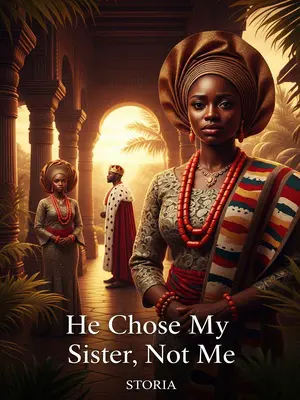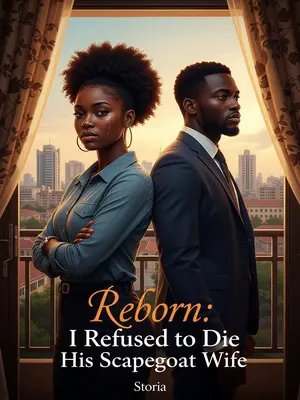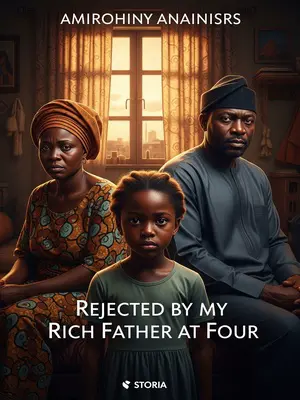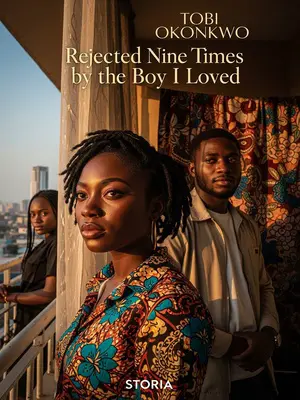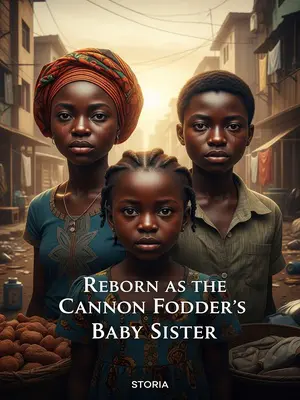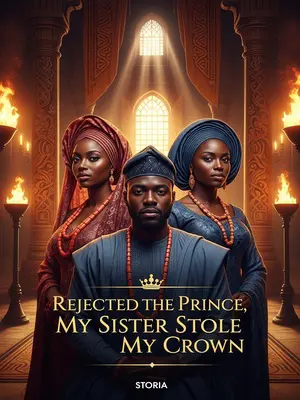Chapter 2: The Price of a Broken Engagement
What happened at the polo match caused serious gist everywhere.
By the time my keke reached the family compound, the whole neighborhood had heard. The housegirls stopped sweeping, peeking through the curtains, and the drivers at the gate argued in low tones, replaying every detail.
When I reached house, Mama had already heard everything.
She sat in the parlor with her wrapper tied tight, brows furrowed, her hands folded over her Bible. I could tell she was both angry and worried, her mood stormy as the Benue river after heavy rain.
In front of me, she first blamed Tunde for being careless and ungrateful, then complained that he's still young and changeable. She talked for as long as it takes for the evening prayer to finish before finally, carefully, asking me if I had really made up my mind.
She paced back and forth, scolding in English and Yoruba, switching to pidgin when she was most vexed. When her words finally softened, her eyes searched mine, pleading for me to choose the path of least shame.
I already thought about everything on the keke ride home.
The city whizzed by my window, sun beating hard on the tin roofs, people moving on with their lives. I replayed every moment—Tunde’s eyes, the flower ball, the look on Mama’s face when she would hear. The answer settled on me like dew.
This matter wasn't hard to solve. It was Tunde that messed up, and if we wanted to settle it quietly and avoid gossip, only two options dey.
My mind ticked through the steps the elders would expect—no fuss, no scandal. I’d seen enough family dramas to know the drill.
First, the Adeyemi elders could come in person to beg and declare openly that Tunde still wanted to marry an Ojo daughter. That would save our family's face.
Such a move would mend pride, smooth talk. The neighbors would nod, saying, “Ah, they handled it like real families.” My heart, though, felt tired just thinking about it.
Second, we could just break ties and stop talking, so people won't suspect anything.
Silence—harder, but cleaner. It would sting, but in time, tongues would wag about something else. The world spins, and people forget.
Even though the Adeyemi family was on top, the Ojo family too was strong—both of us were military families, equal in rank.
No family in Makurdi dared look down on an Ojo. Our name was heavy, our compound wide, our sons respected. Papa’s medals lined the wall, gleaming in the lamplight.
If it came to ending things, it wouldn't be impossible.
There would be gossip, but it would not kill us. My back was strong—Mama reminded me every day.
But for this world, na woman dey suffer pass. Even without an official engagement, the fact say Tunde and I were childhood lovers would make it hard for me to find a good match again.
I remembered what Aunty Ngozi once told me: “Men fit waka anyhow. Woman, if dem hear say you get history, trouble dey.” My chest felt tight.
There were plenty eligible young men and women in the city, but most don marry since their early teens. To find proper husband now no go easy.
All my friends from girls’ college already carried babies on their backs. I was almost a senior maiden now, and the clock did not wait for me.
So Mama still preferred the first option—it would be best for me, for the Ojo family, even for the Adeyemi family. Everybody go benefit.
She pleaded with her eyes, twisting her wedding ring round and round. “It’s for your good, Morayo. Think of your future.”
But since Tunde refused to catch my flower ball that day, I no fit force myself to accept anything half-hearted.
I couldn’t stand the thought of being a pitied wife, my happiness given out like leftover stew. I wanted more than charity.
Mama agreed, and we decided to wait three days. If nobody from the Adeyemi family came to explain within that time, the Ojo and Adeyemi families would break ties for good.
Three days felt like a lifetime. Every knock at the gate made my heart jump, every sound from the parlor another question.
The housegirls quietly packed away the birth date cards, and that was that.
They folded the cards with quiet respect, whispering prayers as they tied the bundles with red string. The engagement beads were locked away, dust motes swirling in the morning sun.
Mama did all the needed arrangements, but to our surprise, after three days, it wasn't the Adeyemi elders that came to beg. Instead, Tunde showed up at our gate, holding a cane as sign of asking for punishment—'bearing the cane and begging forgiveness.'
His head was bare, dust in his hair. He looked so different from the proud boy I remembered, his posture stubborn but his eyes shadowed.
Under the warm March sun, he wore only a thin inner shirt and knelt straight and still at our door.
The sun beat down on him, sweat shining on his forehead, the red dust clinging to his trousers. Passersby stared, some whispering, some shaking their heads. In our culture, to kneel at a family’s door was to admit deep wrong.
No bride price, no marriage contract, not even apology—he just knelt there, as steady as the mango tree growing by our entrance.
Children gathered to stare, giggling until their mothers chased them off. Even the guard at the gate looked troubled, his hand tight on his stick.
When the housegirls reported, Papa vexed.
His voice thundered through the compound. “What nonsense is this? Where are his elders? This is not the way!”
Mama too scolded him, saying he didn't know proper rules.
She muttered about upbringing, about shame, about the world turning upside down. Her voice quivered with anger and pity in equal measure.
Only me, while Papa was angry and Mama was complaining, asked them to bring Tunde into the main parlour.
Something inside me told me I needed to see his face, to hear his reason—no matter how much it would hurt.
After three days apart, he looked even slimmer.
His cheekbones were sharp, his hands rough and calloused. I wondered if he had eaten at all since that day.
Through the thin cloth, his body lines showed sharp, like tree branches.
He looked like someone stretched too thin by worry and regret, his chest rising and falling with every breath.
I still remembered the scar three inches below his left shoulder—a spear wound from fighting Captain Musa's son at age ten. That day, the prize was a coral hairpin.
That day, the whole compound had gathered to watch. He’d refused to give up, even with blood running down his arm. “Na stubbornness dey worry you,” the elders had joked that day. The hairpin was for me—a silly bet, but he kept his promise.
Two inches below his right ribs was a knife scar, gotten at thirteen when I was kidnapped by robbers while traveling. Tunde chased the bus like mad, taking a blade to the chest just to save me.
I can still remember the panic, the rush of wind as the bus sped off, my own voice screaming for help. When Tunde appeared, it was like seeing an angel, wild-eyed and fearless. He bled so much, I thought he would die for me.
I was so scared, pressing a handkerchief to his wound all the way home, barely saving his life.
Mama called on all the saints, my aunties wept, but Tunde just grinned, teeth white as yam.
When he healed, he joked that I cried more tears that day than he shed blood.
He never let me forget it. Whenever I pouted, he would tease, "Should I show you my scars, or will you cry again?"
That coral hairpin and the bloody handkerchief are still safe in my dressing drawer.
Sometimes, at night, I would take them out, touching the past with trembling hands, remembering a time when love felt easy.
But the connection between us was not what it used to be.
A cold wind had blown through, leaving only memories and questions. I felt hollowed out, like a calabash left too long in the sun.
Something inside me felt like it was tearing. I called his name softly.
I didn’t care about the crowd anymore. My voice came out in a whisper, but I knew he heard me.
"Tunde."
His head jerked up, his eyes searching my face for something he could hold on to. I saw the boy I loved—and the stranger he had become.
Only then did he look up, his eyes full of confusion.
For a moment, his old self shone through—tender, lost, afraid. I wished I could reach him across the years.
"That day at the flower ball game—you dropped it on purpose, abi?"
My voice was soft, but every syllable was a knife. The words filled the room, leaving no space for lies.
"...Yes."
He said it so quietly, I almost missed it, but I felt the truth slide into my heart.
"So you no wan marry me?"
The question hung between us, heavy as lead. I could hear Mama’s sharp breath, the rustle of her wrapper as she shifted.
To ask such a thing before marriage wasn't proper, and Mama gave me one sharp look, quickly telling the housegirls to shut the main doors.
The air tightened, the housegirls scurrying to close the doors. Mama’s look said, "Enough of this embarrassment."
Tunde hesitated, then answered.
He stared at the mat, fingers twisting around the cane he still held. My heart pounded in my ears.
"...Yes."
It was barely more than a whisper, but it felt like thunder rolling across the roof.
That one word hit me like heavy bell, echoing in my head again and again.
I gripped the arm of my chair, knuckles white. The echo would not stop—yes, yes, yes, pounding until I wanted to scream.
Each time, it felt like axe was cutting my heart.
I blinked fast, refusing to let tears win. I had never felt so exposed, so raw.
I remembered the mangoes we picked at age eight, the coral hairpin at twelve, even the wedding wine after our marriage. All those memories showed our deep love.
The laughter under the mango tree, the taste of palm wine sweet on my tongue, the hush of wedding drums on our first night—all of it played in my mind, cruel and beautiful.
We had been a happy couple.
The envy of the city, the joy of our mothers, the hope of two proud families.
But after coming back to life, he no longer wanted to marry me.
Fate had twisted, and the thread of our love snapped, leaving only the frayed ends.
I couldn't understand why.
The question burned hotter than the sun outside, a pain with no answer.
My composure broke, and my voice shook without control.
The words fell from my lips before I could stop it, raw and bare, carrying every hope I’d buried. "Why?"
Tunde didn't answer.
He stared at the ground, his mouth set, refusing to meet my eyes. I waited, breath held, but the silence stretched, heavy as a sack of yam.
He just left one sentence: "Miss Morayo, you shine pass gold. If this marriage scatter, na me cause am."
His voice was quiet, but there was a finality to it, a door shutting gently but firmly. The old Tunde would never have called me "Miss Morayo."
With that, he turned and left quickly, almost running out.
His sandals slapped the tiles, and the housegirls peered from behind the curtains. I wanted to call him back, to beg for answers, but pride kept my tongue frozen.
The next day, the Adeyemi family sent someone with a contract and gifts.
They arrived in the late afternoon, with baskets of kola nuts, yams, bottles of palm oil, and a stack of documents in a red folder. The whole compound came alive with whispers and the sharp clatter of plates in the kitchen.
But it wasn't a marriage contract—it was a kinship pact. Tunde's uncle and aunt suggested he should see me as his sworn sister.
They spoke with solemn faces, their voices gentle but unyielding. They praised my character, praised my family, but the meaning was clear—they were drawing a line.
Papa vexed. As a man who hated being looked down on for being military, he grabbed his spear and chased the Adeyemi family away.
He roared so loud, the neighbors came to see. “What insult is this? Sworn sister? In my house?” His hands shook as he waved the spear, but nobody dared argue.
Before leaving, Tunde's aunt held my hand and cried.
Her tears fell on my wrist, warm and salty. She pressed my fingers, her gold bangles clinking. "My daughter, this world is not fair to women. Bear it with dignity, and God will reward you. Your joy will come, even if not today."
Her voice broke, and I saw real pain in her eyes. I nodded, trying not to cry, letting her words wash over me like rain.
So, after years of friendship, the Ojo and Adeyemi families parted ways.
The tie that had bound our families for a generation snapped in a single afternoon. The cooks refused to serve the Adeyemi messengers food, and Papa’s friends gathered to offer consolation, bringing bottles of schnapps and bitter leaf soup.
But because the Adeyemi family came, at least there was a proper explanation for what happened between me and Tunde.
The city would gossip, but nobody could point fingers or spread lies about shame or betrayal.
When people asked, the Adeyemi family only said that Tunde and I had always been like siblings, never once spoiling my name.
My reputation was safe, but my heart was another matter. The ache settled into my bones, silent and stubborn.
So the matter ended.
People moved on. New scandals, new weddings, new whispers. But at night, when the house was quiet, I still heard the echo of Tunde’s voice.
Three days later, news came from the city: Tunde was to be sent to the northern border.
Rumor ran ahead of the official word. Some said he volunteered, others said his grandfather forced him to go. The housegirls argued about it as they pounded yam for dinner.
Tunde and I both came from military families, but because the Adeyemi family had so many loyal heroes and he was their only grandson, he didn't join the army at seventeen in my past life.
His family had protected him, kept him close, afraid to risk their last hope. I remember the long talks under the moon, Tunde confessing his hunger for glory, his fear of dying too soon.
It was only after we married and had our first son that he went to the battlefield. I looked after our child, worrying day and night for his safety.
I prayed, I offered yam at the shrine, I listened for news at the market gate. Every time a messenger arrived, my heart nearly stopped.
But now...
Now we were not married, had no child, and there was no reason for me to worry—yet he still chose to join the army.
I wondered if he was running from me, from himself, or from a past that would not let us rest.
Sharp pain ran through my palm. I looked down and saw Mama was pinching me.
She did it quietly, the way mothers do when they want to remind you who you are without a word. The pain was a secret between us.
She frowned and whispered, "The young master of the Okeke family is here. Why are you still lost in thought?"
Her voice was soft, but her meaning was hard as granite. "You must move on, Morayo. Life does not wait for anyone."
I snapped back and looked at the figure behind the curtain.
My eyes adjusted to the light, taking in the silhouette—broad shoulders, neat cap, a presence that did not fill the room the way Tunde’s did.
He wore a blue kaftan, standing straight like ink-painted bamboo. He didn't have Tunde's boldness, but he had a gentle, scholarly look.
He glanced at me once, quickly, then dropped his eyes, as if afraid to meet the force of my gaze. There was a quiet dignity about him, a patience I did not expect.
This was Chijioke, the second son of the Okeke family.
His people hailed from across the river, known more for their books than their spears. His father was once a teacher, his mother famous for her garden.
The Okeke clan wasn't famous, and none of them held any big position at the state level. The only thing was that their ancestor had been a high chief, so they still had some old reputation in the city.
Papa would say, “Better a good name than plenty money. Palm wine sweet, but reputation last longer.” Their compound was old but clean, their palm wine the sweetest in Makurdi. People said the Okeke name still carried weight in certain corners.
By Chijioke's time, all that was left was their good name and old house.
He did not seem to mind. He carried himself with quiet pride, the kind that comes from a line of storytellers and poets.
"This second Okeke son passed the WAEC and university entrance this year. He's young and writes well. How is he less than Tunde?" Mama whispered, hoping I'd agree to the match.
She nudged me gently, her eyes urging, her voice soft as cotton. She wanted me to see sense, to put pain behind me and accept what the gods had provided.
Papa, a straightforward military man, always respected the Okeke family. If not for Tunde, he would have married me to the Okekes long ago.
So now, with Tunde out of the way, Chijioke was the first person they thought of.
His name came up as soon as the Adeyemi contract was torn. The elders wasted no time.
But as I looked at the man in front of me, all I felt was tiredness. My heart was weary—tired of schemes, tired of being traded like yam at the market. I drew a slow breath, then spoke: “Why must a woman marry?”
Not because of who he was, but because of everything that had happened and all the things I'd heard.
All the old tales ran through my mind—the warnings, the lessons, the fears mothers whispered to daughters after dark.
"Why must a woman marry?"
The words leapt from my lips, shocking even me. My voice was quiet, but it cracked like dried wood.
"Why is it shameful if she can't find a good husband?"
I felt Mama’s hand twitch, the air thickening. My aunties would have fainted at such talk, but I could not stop.
"Why must I, who can handle spear and bow, spend my life hidden in a man's house?"
I remembered the feel of the spear in my hands, the thrill of a well-aimed arrow. I wanted to live, not just survive.
If there was true love, I would accept. But clearly, there was neither love nor loyalty.
What was the point of marriage if all it brought was duty and disappointment? I wanted more, even if it meant walking alone.
These thoughts ran wild in my mind.
They chased each other like goats on market day, impossible to cage.
I knew such talk was rebellious and shouldn't be said, but before I knew it, I had already said everything out loud.
Mama’s eyes widened, her mouth half-open. The room seemed to shrink, the silence growing heavy.
Mama's hand, halfway to cover my mouth, froze in the air. She scolded me softly, frustrated: "You don't know the rules."
Her voice was low, urgent. I heard worry and love and fear tangled in every word.
Behind the curtain, Chijioke's shoulders shook a bit. He kept quiet for a long time.
He sat still, fingers wrapped around his cup, lips pressed together. I wondered what he was thinking—if he saw me as trouble, or something else entirely.
Mama sighed. "Young Master Okeke, abeg no vex. My daughter is spoiled and talks anyhow. Don't take it to heart."
She tried to smooth things over, her tone apologetic but proud. The Okeke boy smiled faintly, as if he understood more than he let on.
Chijioke sat up straight, holding his teacup, silent.
His hands did not shake. The blue kaftan looked brighter in the sunlight, his posture steady as a drumbeat.
I almost thought the marriage talk was over, when at last he spoke:
His voice was soft but clear, words tumbling out like pearls onto a mat.
"Miss Morayo doesn't talk carelessly—every word she said get value.
"This world has always been harder for women than men. Miss Morayo's understanding is rare and precious.
"But whether there is a broad road in this world for women to walk, that one depends on..."
He paused, eyes meeting mine at last. In that moment, something shifted in the air—like harmattan wind about to change direction.

